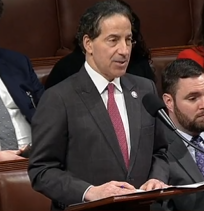WASHINGTON, D.C. — The House Judiciary Committee has approved the “Protect Reporters from Exploitative State Spying (PRESS) Act,” legislation introduced by American University Washington College of Law Professor Emeritus and Maryland Congressional Democrat Jamie Raskin, in addition to Kentucky Rep. John Yarmuth and California Rep. Ted Lieu.
It’s now up to the full U.S. House of Representatives, and Senate action, to see if it heads to the White House for President Biden’s signing.
H.R. 4330 would safeguard “a free and independent press” by establishing a federal statutory privilege to protect journalists from being compelled to reveal confidential sources and prevent federal law enforcement from abusing subpoena power.
It’s a potentially powerful piece of legislation for the television business, in addition to print and online journalist hubs; it is also a matter of significance for audio journalists in the broadcast and on-demand space at such organizations as NPR, iHeartMedia, Audacy Inc., and the like.
The House Judiciary Committee passed the PRESS Act on a unanimous bipartisan voice vote.
Raskin has gained fame for his heroic actions during the January 6, 2021, protests and “insurrection” by supporters of former President Donald J. Trump, leading Members to shelter as an angry mob stormed the U.S. Capitol while House activities were in session.
He said on Wednesday, “The constitutional promise that no law shall abridge the freedom of the press instructs us to protect journalists from government overreach and abuse of the subpoena power, and today this committee has made good on that promise.”
Yarmuth commented, “I’m so proud that our PRESS Act cleared the Judiciary Committee today and is one step closer to passage in the House. As the first Society of Professional Journalists member to be elected to Congress, I know how important it is that we protect journalists and their ability to speak truth to power without fear of retaliation or retribution. I thank my colleague, Congressman Raskin, for his leadership in pushing this important legislation through the committee.”
Lieu also chimed in, saying, “The PRESS ACT by Rep Raskin and me enables journalists to exercise their constitutional rights without fear of interference from the government. I hope we can now get this bill to the floor for a vote and reaffirm our support for one of the most essential pillars of our Democracy.”
The House Judiciary Committee is led by Rep. Jerry Nadler (D-N.Y.). It’s former Chair, Bob Goodlatte, was joined by former Subcommittee on Communications and the Internet Chair Rich Boucher, in thanking Nadler for bringing the bill to a vote, thus sending it to the full House for consideration.
Raskin previously introduced a bipartisan federal press shield bill in 2017. That bill was based on a 2007 press shield bill (H.R. 2102) that passed the House with overwhelming bipartisan support on a 398-21 vote and was championed by then-Congressman Mike Pence.
Senator Ron Wyden (D-Ore.) introduced a Senate version of the bill in 2021.
With the House Judiciary Committee’s passage of H.R. 4330, NAB President/CEO Curtis LeGeyt applauded the vote.
“Embracing the right of a free press to report the news without fear or favor, journalists rely on confidential sources to shine a light on wrongdoing in government, expose waste of taxpayers’ dollars and hold our elected officials accountable,” he said. “Broadcasters appreciate the leadership of Reps. Raskin, Lieu and Yarmuth on this important issue, and Sen. Wyden’s sponsorship of companion legislation in the Senate. We look forward to working with all members of Congress to pass this important legislation that upholds a guiding principle of American democracy.”





